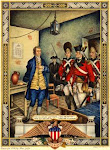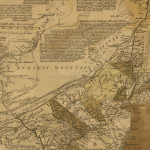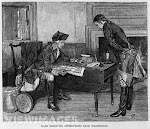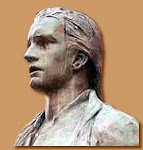During this project, I learned a lot about Nathan Hale. I only knew very little about him before this project: that he was a teacher and he had said his famous quote. Nathan Hale had a bigger life as a teacher before he joined the army. I thought he was just a normal teacher. It turned out that he was a very appreciated teacher and was really devoted to his students. I also didn't know that he was sort of a 18th century bachelor. This project also thought me how to use a blog more efficiently. I must admit that while making this blog, I learned that I need to review how to make a proper work cited. While making the bibliography, I had to look back at how to make one, several times. I still think I did some of it wrong
Thursday, February 28, 2008
Saturday, February 23, 2008
Would I Be Nathan Hale's Friend?
I guess I would be Nathan Hale's friend (not that I think he needs anymore). I can relate to him in many ways. My personality is one that doesn't really like the quiet. Nathan got bored and lonesome when he was a teacher in East Haddam, he didn't like the rural area and lack of mail. He enjoyed it better in the bustling urban city, where they had a newspaper. I like the suburbs best, but the urban is better than the rural. I also like his bravery. When he was hanged, he wasn't even much scared. All he did was say his famous words, 'I have one regret, that I have but one life to live for my country'.
What I Did for a Living
Before I was elected 1st Lieutenant of the Connecticut's Militia, I had a job elsewhere. When I graduated Yale, I took a job teaching in rural East Haddam. I soon got bored and lonely, missing my fellow college mates. I was very happy when I was offered a job in the prestigious Union School in the a bustling seaport town on the coast of Connecticut. Connecticut was much better. My classes consisted of around 30 young men that were thought Latin, Mathematics, and all the basic standards. In 1774, I also conducted a summer morning class for women, from 5 am to 7am. People thought that the ladies were willing to attend such an early class, they were more interested in the schoolmaster than the actual subject.
Most people teach as a temporary job. As for me, my love of teaching influenced the students. Both students and parents appreciated, soon I was offered a job as a Master at the Union School. After some time, I finally decided to accept the offer. When my militia had to help out in the battle of Bunker Hill. I had to stay behind; my teaching contract didn't end until June and I was devoted to my students. In July, after receiving a letter from my friend who was in the army, I had to quit my job as a teacher and aid my county.
Most people teach as a temporary job. As for me, my love of teaching influenced the students. Both students and parents appreciated, soon I was offered a job as a Master at the Union School. After some time, I finally decided to accept the offer. When my militia had to help out in the battle of Bunker Hill. I had to stay behind; my teaching contract didn't end until June and I was devoted to my students. In July, after receiving a letter from my friend who was in the army, I had to quit my job as a teacher and aid my county.
Friday, February 22, 2008
A Briefing on My Childhood and Home
I was the sixth one of the ten surviving siblings in my family. I was born into two very respectable New England families. Both my father, Richard Hale, and my mother, Elizabeth Strong, were puritans and very religious. My father was a deacon of the church and was considered the pillar of the community.
In my early years, I was marred in sickness but soon turned out to be a strong, healthy, quick-minded child. My mother and Grandmother both encouraged my education. I was tutored by the minister and was soon influenced by his love of learning.
When I was 14, my brother, Enoch and I were sent to learn at Yale University. During my college years, I was exposed to education in religion and all the classics. The main goal of the education was to prepare us for a job in the ministry, however most took jobs in law and business. After graduating college, like most young graduates, I took a job in teaching school.
In my early years, I was marred in sickness but soon turned out to be a strong, healthy, quick-minded child. My mother and Grandmother both encouraged my education. I was tutored by the minister and was soon influenced by his love of learning.
When I was 14, my brother, Enoch and I were sent to learn at Yale University. During my college years, I was exposed to education in religion and all the classics. The main goal of the education was to prepare us for a job in the ministry, however most took jobs in law and business. After graduating college, like most young graduates, I took a job in teaching school.
Friday, February 1, 2008
My Only Opposition
My only opposition is the British. I can tell because of two reasons. First, it's logic to think that the opposite side of the war would be your enemies because your fighting against them. But there is another reason they despise me, they hate the courage I have to die for my country. The day before I was hanged, I had to spend the night in the greenhouse of the mansion. The greenhouse had to compensate as my jail cell. One of the soldiers guarding the jail, who was kinder than the Colonel that was running the jail, gave me a pen and ink to write my final letters. When I had wrote my last good-byes to those I wouldn't be able to say good-bye to later, I handed them to the soldier. I heard his footsteps walking outside as he handed the letters to the Colonel to send out as my last wish. Even from inside this lonesome cell, you could hear the Colonel vociferating about how he was disgusted at how proud and willing I was to die for my country, and that he would never let the Patriots know about that. I let my head rest against the cold stone wall as I heard the slight sound of crinkling paper.
Thursday, January 31, 2008
5 Facts About Me

- When I was fourteen, my brother and I were sent to Yale University.
- Before the war had started, I had graduated from college and worked as a teacher.
- When the war did start, I enlisted in the Connecticut Militia and was elected first lieutenant.
- When I had moved to the Continental Army, I had been promoted to Captain and led a small unit of Lt. Col's army.
- After I had made my speech, and was hanged, I was designated state hero of Connecticut.
Tuesday, January 29, 2008
Thorough Explanation of my Death
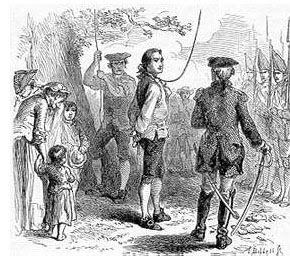
Here is a journal entry I wrote. (Not actually real)
Dear Journal,
It is late August, and today I volunteered to sneak behind enemy lines to spy on the British, after the British won the Battle of Long Island and has taken over New York City. General Washington has retreated his troops back to the islands northern tip in Harlem Heights.
Sincerely,
Nathan Hale
Later afterwards, on September 21, 1776, there was a big fire later called the Great New York Fire of 1776. People said that this fire was started by the Americans last attempt to prevent the British from taking over the area, even if Congress rejected the idea. Some say that the fire was started by the British to scare away of the remaining Patriots in the area. But, the truth remains, there was 200 people rounded up that day, and i was one of them...
How exactly did the British figure out that I was a Patriot? I'm not even sure. According to a shopkeeper in Connecticut, I was met by Major Robert Rogers in a Tavern. Supposedly, he saw through my disguise and I was dragged back to British headquarters. Others say that my loyalist cousin reported me to the British.
I met General Howe in a place in rural Manhattan. He questioned me, searched me, and found the notes I had been taking for the Patriots. I was officially declared a spy. The traditional rule is that spy's were hanged as illegal combatants. So the next day, I was to be hanged.
On September. 22, 1776, after spending the night in the greenhouse of the mansion, I was marched down to the artillery. I was asked one final time if I wanted to be spared and use my skills for the British. I refused without even flinching. The general asked if I had any last regrets, this is what I said, 'I only regret that I have but one life to lose for my country." I was 21 when I died but I had lived a fulfilling life.
The Reason for my Fame
The reason that I'm known is because of one sentence:"I have but one regret, that I have only but one life to lose for my country." This is what I said when I was hanged. This is the speech that supposedly showed the British, the courage of the Patriots and how important freedom was to us.
Monday, January 28, 2008
My Role in The Building of this Nation
My job in the building of this nation was not really a big part, but still big enough. I was to spy on the british and report back to the Patriots. I will go into further detail later.
Thursday, January 24, 2008
Nathan Hale
I was first born in Conventry, Connecticut on June, 6. 1768. I was hanaged in New York on September, 22, 1776.
- information was found at http://en.wikipedia.org/wiki/Nathan_Hale
Subscribe to:
Posts (Atom)
